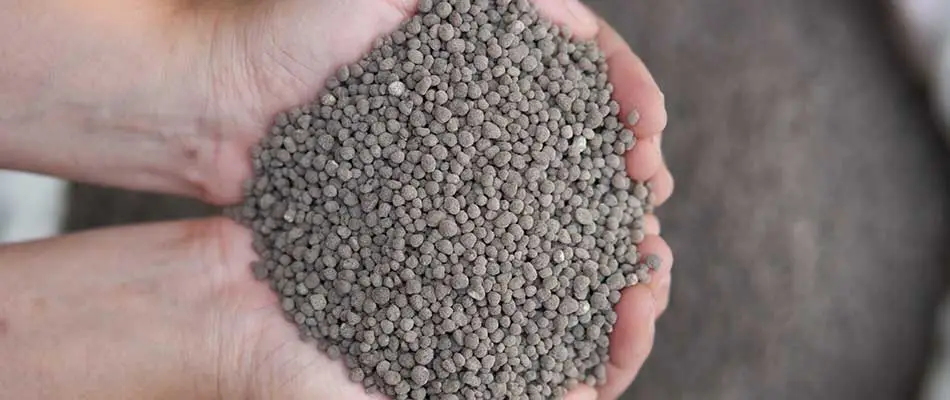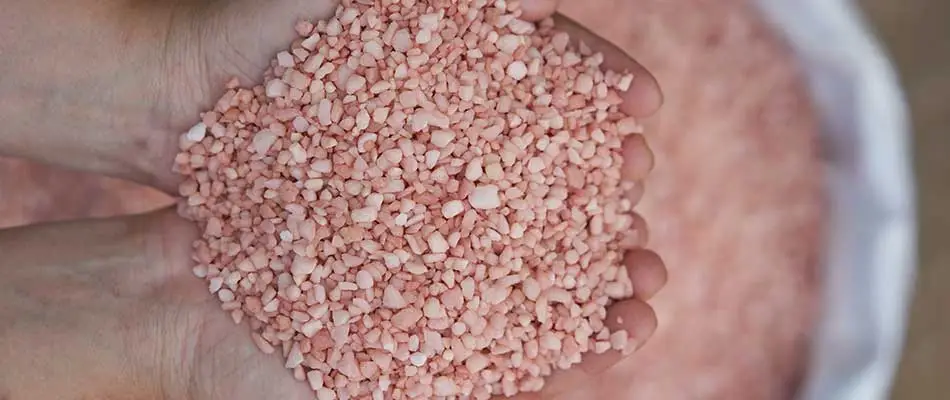Most property owners know that fertilizers are essential in order for their turf to be at its best health. All fertilizer treatments make use of three primary nutrients that all grass needs to thrive: nitrogen, phosphorus, and potassium. There are other nutrients that should also be present in fertilizers, such as calcium, magnesium, and sulfur, however, they are only needed in smaller quantities.
Each major nutrient has a big role to play in proper grass growth and health including:
- Production of chlorophyll
- Encouragement of root development
- Disease and pest-resistance
Read on to find out how nitrogen, phosphorus, and potassium affect your lawn and how to determine how much of each nutrient is in one bag of fertilizer.
Nitrogen is needed for that lush, green color.
Nitrogen is often considered the most important nutrient that plants need. It has a limited supply in nature, that's why many plants have adjusted to take in large quantities of nitrogen. As they keep growing, so does the demand for nitrogen.
What is the importance of nitrogen? Nitrogen encourages the production of chlorophyll, which we know is what gives grass and plants that green color. It is also essential for the process of photosynthesis, which is how our grass converts sunlight into food.
If your once green grass starts to turn yellow, this might be a sign of a nitrogen deficiency.
Phosphorus encourages root development.

Phosphorus also plays a role in the process of photosynthesis, transforming solar energy into chemical energy. It also plays an important part in stimulating root development and is essential for grass to grow and develop normally.
It is important to note, though, that there are several states, including Michigan, that have banned or regulated the use of phosphorus fertilizer for lawns or turfs. This is because the use of phosphorus has resulted in eutrophication, which is when bodies of water receive an excessive amount of nutrients due to runoff, thus harming wildlife. It is important to stay up to date on the phosphorus rules and regulations when fertilizing your lawn or hiring a professional company to do so. Our company is always up to date on the latest news about phosphorus regulations and always adheres to these state rules.
Potassium helps your grass resist disease.
Potassium activates the enzymes that help your grass handle and resist temperature changes, pests, and diseases. It is common for a lot of winter fertilizers to include large amounts of potassium to give lawns extra armor to handle the frigid months ahead.
Other roles that potassium does include:
- increasing the protein content
- improves the growth of roots
- regulates respiration to prevent loss of energy
What do the numbers on the fertilizer mean?
Those who have seen fertilizers might have noticed the three bold numbers placed on the packages. This is called the fertilizer grade or NPK ratio. The fertilizer grade indicates the minimum ratio of the nutrients in the package. For example, a 10-10-10 label would mean 10% nitrogen. 10% phosphorus, and 10% potassium. This ratio will vary, depending on the time of year and the type of grass you have. It's important to know the right amount of fertilizer to use for your lawn. Applying too much or too little will have negative effects on your lawn.
At Big Lakes Lawncare, our fertilizers mostly contain potassium and nitrogen. We do have phosphorus in some variants of our fertilizers, but since the state of Michigan regulates the use of phosphorus, it is only under certain circumstances. We use phosphorus when a soil test indicates low levels of it or when we are encouraging new grass to grow.
Trust our team to add the correct amount of nutrients to your lawn every single time. Call (586) 200-0855 today.
Our company offers fertilization services for properties in Macomb, Shelby, Chesterfield, and surrounding areas in Michigan. We are experts in this business, having been in the industry since 2014. We understand that different types of grass require different amounts of nutrients and we will always adhere to our state's limitations on phosphorus.
Call us at (586) 200-0855 to schedule your fertilization treatments and make your lawn the envy of the whole neighborhood!




Comments (0)
Thanks for your comment!
Thanks for your feedback! Your comments have been successfully submitted! Please note, all comments require admin approval prior to display.
Error submitting comment!
There is a problem with your comment, please see below and try again.